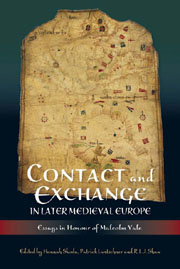Book contents
- Frontmatter
- Contents
- List of Illustrations
- List of Contributors
- Acknowledgements
- The Work of Malcolm Vale
- Principal Bibliography of Malcolm Vale
- Introduction
- Part I Boundaries and Units
- Introduction
- Economic Development, Social Space and Political Power in Bruges, c. 1127–1302
- Flemings in the Peasants' Revolt, 1381
- Does a Common Language Mean a Shared Allegiance? Language, Identity, Geography and their Links with Polities: The Cases of Gascony and Brittany
- Revisiting the Political Uses of Vernacular Language in Portugal during the Thirteenth Century: On Models, Motives and Modes
- Scotland in the Later Middle Ages: A Province or a Foreign Kingdom for the English?
- The Angevin Legacy, Dynastic Rivalry and the Aftermath of the Hundred Years War, 1453–1491
- Part II Practices of Exchange
- Conclusions
- Index
- Tabula Gratulatoria
Scotland in the Later Middle Ages: A Province or a Foreign Kingdom for the English?
from Part I - Boundaries and Units
Published online by Cambridge University Press: 05 February 2013
- Frontmatter
- Contents
- List of Illustrations
- List of Contributors
- Acknowledgements
- The Work of Malcolm Vale
- Principal Bibliography of Malcolm Vale
- Introduction
- Part I Boundaries and Units
- Introduction
- Economic Development, Social Space and Political Power in Bruges, c. 1127–1302
- Flemings in the Peasants' Revolt, 1381
- Does a Common Language Mean a Shared Allegiance? Language, Identity, Geography and their Links with Polities: The Cases of Gascony and Brittany
- Revisiting the Political Uses of Vernacular Language in Portugal during the Thirteenth Century: On Models, Motives and Modes
- Scotland in the Later Middle Ages: A Province or a Foreign Kingdom for the English?
- The Angevin Legacy, Dynastic Rivalry and the Aftermath of the Hundred Years War, 1453–1491
- Part II Practices of Exchange
- Conclusions
- Index
- Tabula Gratulatoria
Summary
The title of this chapter may sound provocative. It must be clear from the start that I have no intention of excluding Scotland from the small number of West European monarchies which deserve to be considered as modern states in the making: that is to say, states deeply immersed in intensive warfare, involving the building of an efficient fiscal system and the development of representative institutions able to provide the necessary political legitimation and consensus without which the rise of these socio-political structures would be impossible. However, although all these elements were present in late medieval England and the Scottish king spoke the language of the modern state early on, the emergence of this political structure remained a contentious issue in Scotland: the struggles between the ‘Royal Stewarts’ and other aristocratic lineages such as the different branches of the Douglas family reached a degree of violence exceeding accepted standards, not to speak of the situation in the Highlands.
However, what is at stake here is not Scotland per se. Rather, it is the English perspective, the English view of Scotland as a kingdom and an independent state. In his seminal study of fifteenth-century English diplomacy, John Ferguson, following the path of his teacher, G. P. Cuttino, finds no room for Scotland in his survey of the English diplomatic machinery. In the tabulation of the data which he included in his study of English medieval diplomacy, 417 missions were sent abroad in the name of the king of England under the reign of Henry VI.
- Type
- Chapter
- Information
- Contact and Exchange in Later Medieval EuropeEssays in Honour of Malcolm Vale, pp. 127 - 144Publisher: Boydell & BrewerPrint publication year: 2012



